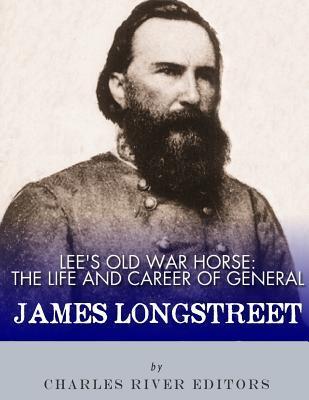Lee's Old War Horse: The Life and Career of General James Longstreet

Lee's Old War Horse: The Life and Career of General James Longstreet
*Includes pictures of Longstreet and other important Civil War generals, as well as maps of battles he fought in.
*Discusses the controversies surrounding Longstreet's performance at Gettysburg
*Analyzes Longstreet's legacy and the post-war debates among Longstreet and other Confederate generals.
*Includes a Bibliography for further reading.
One of the most important, and controversial, Confederate generals during the Civil War was Lieutenant General James Longstreet, the man Robert E. Lee called his "old war horse." Longstreet was Lee's principal subordinate for most of the war, ably managing a corps in the Army of Northern Virginia and being instrumental in Confederate victories at Second Bull Run, Fredericksburg, and Chickamauga. Longstreet was also effective at Antietam and the Battle of the Wilderness, where he was nearly killed by a shot through the neck.
Had Longstreet died on the field in early May 1864, he would almost certainly be considered one of the South's biggest heroes. However, it was his performance at Gettysburg and arguments with other Southern generals after the Civil War that tarnished his image. After the South lost the war and Gettysburg came to be viewed as one of its biggest turning points, former Confederate generals looked to that battle to find scapegoats to blame for losing the war. Longstreet was charged with being slow to attack on the second day of the Battle of Gettysburg, allowing the Union to man Little Round Top. He also resisted Lee's order for Pickett's Charge the next day, making his criticisms clear both that day and after the war through his writings. The fact that he served in Republican administrations after the Civil War rubbed his former comrades the wrong way, and the Georgian Longstreet's criticism of Lee infuriated the Virginian Lost Cause advocates who idolized Lee.
Near the end of his life, Longstreet authored From Manassas to Appomattox, a Civil War memoirs that looked to rebut his critics. Longstreet didn't avoid his critics, facing them head on by fending off criticisms of his record for the most part, usually including letters written by other officers to his defense. Longstreet also didn't pull punches, which he does at times quite poignantly on Lee's mishaps, most notably of course at Gettysburg. In other instances, he defends himself by criticizing others. When Fitz Lee notes that R.E. Lee called Longstreet the hardest man to move in the Army (a comment that can't be conf
PRP: 87.11 Lei
Acesta este Prețul Recomandat de Producător. Prețul de vânzare al produsului este afișat mai jos.
78.40Lei
78.40Lei
87.11 LeiLivrare in 2-4 saptamani
Descrierea produsului
*Includes pictures of Longstreet and other important Civil War generals, as well as maps of battles he fought in.
*Discusses the controversies surrounding Longstreet's performance at Gettysburg
*Analyzes Longstreet's legacy and the post-war debates among Longstreet and other Confederate generals.
*Includes a Bibliography for further reading.
One of the most important, and controversial, Confederate generals during the Civil War was Lieutenant General James Longstreet, the man Robert E. Lee called his "old war horse." Longstreet was Lee's principal subordinate for most of the war, ably managing a corps in the Army of Northern Virginia and being instrumental in Confederate victories at Second Bull Run, Fredericksburg, and Chickamauga. Longstreet was also effective at Antietam and the Battle of the Wilderness, where he was nearly killed by a shot through the neck.
Had Longstreet died on the field in early May 1864, he would almost certainly be considered one of the South's biggest heroes. However, it was his performance at Gettysburg and arguments with other Southern generals after the Civil War that tarnished his image. After the South lost the war and Gettysburg came to be viewed as one of its biggest turning points, former Confederate generals looked to that battle to find scapegoats to blame for losing the war. Longstreet was charged with being slow to attack on the second day of the Battle of Gettysburg, allowing the Union to man Little Round Top. He also resisted Lee's order for Pickett's Charge the next day, making his criticisms clear both that day and after the war through his writings. The fact that he served in Republican administrations after the Civil War rubbed his former comrades the wrong way, and the Georgian Longstreet's criticism of Lee infuriated the Virginian Lost Cause advocates who idolized Lee.
Near the end of his life, Longstreet authored From Manassas to Appomattox, a Civil War memoirs that looked to rebut his critics. Longstreet didn't avoid his critics, facing them head on by fending off criticisms of his record for the most part, usually including letters written by other officers to his defense. Longstreet also didn't pull punches, which he does at times quite poignantly on Lee's mishaps, most notably of course at Gettysburg. In other instances, he defends himself by criticizing others. When Fitz Lee notes that R.E. Lee called Longstreet the hardest man to move in the Army (a comment that can't be conf
Detaliile produsului










